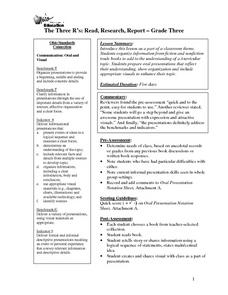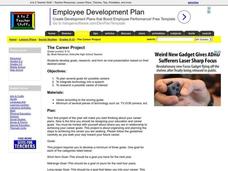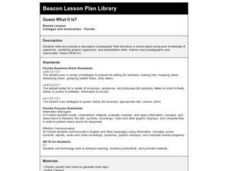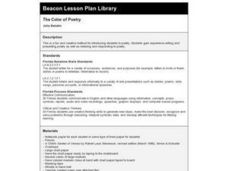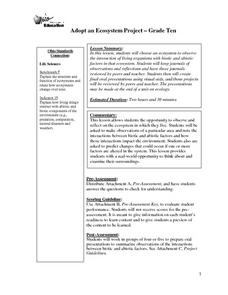Curated OER
Oral History
Students create oral histories. In this oral history lesson, students prepare for and conduct interviews with Holocaust survivors, liberators, or rescuers. Students study the provided procedure for the interview and present their...
Scholastic
What’s the Good Word? Etymology Project Guidelines
Who named the shapes, or the days of the week? Should words be removed from the dictionary if they're no longer commonly used? Are there too many words in the English language? Language arts students explore these and additional...
Curated OER
The American Dream
Students discuss the American dream and explain what the American Dream consists of. In this American Dream lesson, students listen to music about America for the reasons people love America. Students create a list of wants and...
Curated OER
Oral Interviews on Traditions and Celebrations
Pupils practice speaking in a target language through the use of oral interview techniques. They engage in conversations with peers using a certain theme of celebration and tradition. Students plan questions that they use in the...
Curated OER
Right to Remain Silent(?)
Learners consider the rights of journalists regarding source confidentiality, then create presentations on the New York Times' use of sources. They write guidelines to aid journalists in evaluating the trustworthiness of their sources.
Curated OER
Read Research and Report
Third graders organize information from fiction and nonfiction trade books to add to the understanding of a /curricular topic. They prepare oral presentations that reflect their understanding, show organization and include appropriate...
Curated OER
The Career Project
Students develop goals, research, and form an oral presentation based on their desired career. Students give an oral presentation of their short-term, mid-range and long-term career goals.
Union Elementary School District
Famous Dead People Project
Despite the slightly off-putting title, the instructions and activities detailed in these project guidelines for researching a noteworthy figure will serve as a fantastic supplement to your next famous person research...
Curated OER
Are You an Optimist or a Pessimist?
Listening is a skill. This lesson will provide your pupils with clear guidelines for what to do when someone else is speaking. Whether you ask them to note key words in a talk, to prepare two questions about the presentation, or to note...
Curated OER
Record or Perform Your Own Pod Cast
Students present a pod cast. For this information technology lesson, students determine the vital components to an informative and entertaining pod cast. Students discuss the purpose of a pod cast. Students write, rehearse and record a...
Curated OER
Twisting Versions of Little Red Riding Hood
Students read orally two versions of Little Red Riding Hood (Classic and Cajun) They compare and contrast the two Little Red Riding Hood versions. Students create a concept map to demonstrate the comparisons/contrasts. They could also...
Curated OER
Transformations
Students identify the types of transformations in their lives. As a class, they determine the ones they have control over and which ones they do not. They practice solving problems in math and oral communication that they are faced with...
Curated OER
First Steps Toward Source Citation: Author Research
Students, in pairs, research a prominent author and design a presentation poster for the rest of the class. They complete a Works Cited page for their presentation, as well.
Curated OER
Job Talk
Students write about a job. In this careers and communication lesson, the teacher explains how stories are structured, then students choose a career to research and present the information to the class.
Curated OER
Rhetorical Devices
Eleventh graders consider rhetorical devices in speeches and then make an informed selection of effective rhetorical devices for a controversial topic presentation. Students present their findings using presentation software.
Curated OER
Rhetorical Devices
Twelfth graders identify and analyze examples of rhetorical devices as valid or invalid inferences. In this text analysis lesson, 12th graders research a controversial topic in teams and identify rhetorical devices for the topic....
Curated OER
Revolutions in the Solar System
Third graders conduct research on the solar system. In this solar system lesson, 3rd graders will work in groups of four to create a power point presentation from their findings. They divide the research amongst the members in their...
Curated OER
Kwanzaa
Students explore African American holiday of Kwanzaa, orally share ideas about whom they want to invite to classroom Kwanzaa celebration, create and print invitation to Kwanzaa using Publisher or Print Shop, and share completed...
Curated OER
Guess What It Is?
Third graders write and present a descriptive 'powergraph' that describes a secret object using prior knowledge of adjectives, clustering graphic organizers, and presentation skills. Authors read powergraphs and classmates 'Guess What It...
Curated OER
Where Do I Fit In The Food Pyramid?
Students discuss how their daily diets fit into the dietary guidelines set out by the food pyramid. They write a paragraph describing good health habits and identify areas where their personal diet can be improved.
Curated OER
In Your Opinion: Are Athletes Heroes?
Young scholars identify athletes that could be classified as heroes. They participate in a debate in which they argue whether or not they should be classified as such. They are evaluated on how they work together and the information...
Curated OER
The Color of Poetry
Students listen to a story about colors and then write their own color poems.
Curated OER
Adopt An Ecosystem
Tenth graders choose an ecosystem to observe the interaction of living organisms with biotic and abiotic factors in that ecosystem. They keep journals of observations and reflections in order to have a resource for further...
Curated OER
Persuasive Speech
Tenth graders participate in a lesson that is focused on the concept of writing persuasive speechs. They conduct research from a variety of sources in order to gather information to write well informed speeches.





